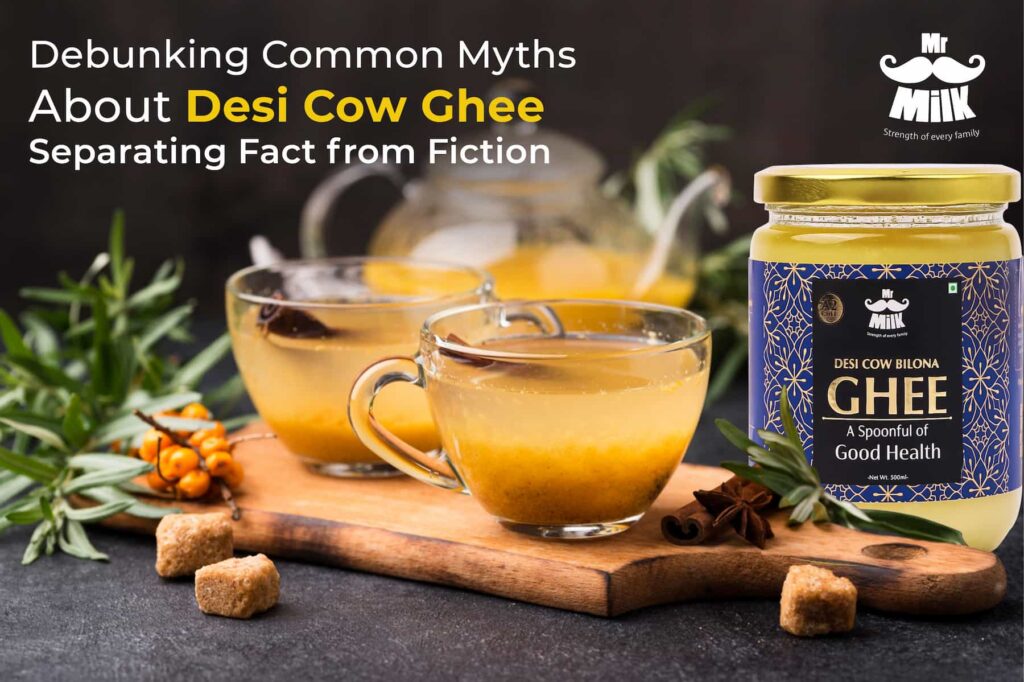Debunking Common Myths About Desi Cow Ghee | Separating Fact from Fiction
Desi Cow Ghee has been integral to Indian cuisine and traditional medicine for centuries. Despite its popularity, there are numerous myths surrounding this golden elixir.
Today, let’s debunk some of the most common myths about Desi Cow Ghee and separate fact from fiction.

Myth 1: Ghee is Fatty and Unhealthy:
Fact: While ghee is a source of fat, it is a healthy fat when consumed in moderation. Desi Cow Ghee contains Omega-3 fatty acids and CLA (Conjugated Linoleic Acid), known to reduce bad cholesterol and improve heart health. It’s also rich in vitamins A, D, E, and K, essential for overall well-being.
Myth 2: Ghee Causes Weight Gain
Fact: Consuming ghee in moderation can aid in weight loss. The medium-chain fatty acids in ghee are used by the body for energy, rather than being stored as fat. Ghee also helps in improving digestion and metabolism, which can contribute to weight management.
Myth 3: Ghee is Not Suitable for People with Lactose Intolerance
Fact: Desi Cow Ghee is virtually lactose-free and can be consumed by those who are lactose intolerant. The milk solids are removed during the making of ghee, leaving behind pure butterfat, which doesn’t contain lactose.
Myth 4: Ghee Increases Cholesterol Levels
Fact: Ghee can help balance cholesterol levels. The Omega-3 fatty acids in ghee help reduce bad cholesterol (LDL) and increase good cholesterol (HDL). When consumed in moderation, ghee can support a healthy heart.
Myth 5: Ghee is Only Good for Cooking
Fact: While ghee is excellent for cooking due to its high smoke point, it also has numerous health and beauty benefits. It can be used as a moisturizer for dry skin, a remedy for chapped lips, and even in hair care routines to promote healthy, shiny hair.
Desi Cow Ghee holds a revered place in Ayurveda, known for its healing and nourishing properties. Used for centuries, it is believed to balance the doshas, enhance digestion, and boost immunity. This golden elixir is also utilized in Ayurvedic treatments for its anti-inflammatory and detoxifying benefits, promoting overall wellness.
Myth 6: Desi cow ghee is all the same, no matter where you buy it
Fact: Not all ghees are created equal. Desi Cow Ghee, especially A2 Desi Cow Ghee, is made from the milk of indigenous cow breeds like Gir and Sahiwal and is considered superior in quality. It contains A2 beta-casein protein, which is easier to digest and has more health benefits compared to regular ghee.
Big difference! The quality of ghee depends on the source of the milk. Ghee made from the milk of indigenous cows raised in stress-free environments, like A2 desi cow ghee, is considered superior. This type of ghee is believed to be richer in nutrients and has a more distinct flavour.
Myth 7: Ghee is Harmful for Diabetics
Fact: Ghee, when consumed in moderation, can be beneficial for diabetics. It helps in managing blood sugar levels by improving the functioning of beta cells that produce insulin. However, diabetics need to consult their doctor regarding the amount of ghee suitable for their diet.
Myth 8: Ghee is Outdated and Not Modern
Fact: Desi Cow Ghee is making a strong comeback as people become more health-conscious and look for natural, wholesome food options. It is being incorporated into modern diets and cuisines worldwide for its taste, health benefits, and versatility.
Now that you know the truth about desi cow ghee, it’s time to experience the magic for yourself! At Mr Milk, we offer pure, A2 desi cow ghee made with the utmost care. Our cows are raised in stress-free environments, and our ghee-making process (The Traditional Bilona Method) ensures you get the highest quality product.
Ready to unlock the true potential of desi cow ghee?
Download or update our app to order A2 desi cow ghee conveniently. You can also visit our website to explore our range of products.
With Mr Milk A2 desi cow ghee, you can add a touch of tradition and a whole lot of goodness to your life.
So, ditch the myths and embrace the real deal!
